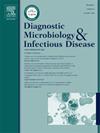Pseudomonas guariconensis Necrotizing soft tissue infection, Denmark
IF 1.8
4区 医学
Q3 INFECTIOUS DISEASES
Diagnostic microbiology and infectious disease
Pub Date : 2025-09-23
DOI:10.1016/j.diagmicrobio.2025.117121
引用次数: 0
Abstract
We describe the first published case report of a successful treatment of Pseudomonas guariconensis-induced Necrotizing Soft Tissue Infection (NSTI). Since Pseudomonas guariconensis has been resistant to meropenem in all reported cases, clinicians and microbiologists should treat these patients with extreme care.
Patient and methods
A 72-year-old man presented to the emergency department with a 3-day history of fever, pain in the right leg/foot and general malaise. He was diagnosed with NSTI, empirical meropenem and clindamycin was started, and surgery was quickly performed with removal of all dead skin and subcutaneous tissue. All fasciae were intact.
Results
Blood cultures and tissue samples showed growth of Pseudomonas guariconensis, which a literature review revealed to be highly suspicious of meropenem resistance. This prompted quick change of antibiotics, first with ciprofloxacin and metronidazole added and then change of meropenem to cefiderocol. Susceptibility tests on both blood and tissue samples revealed resistance to meropenem (along with resistance to many other antibiotics). The patient improved, was changed to ceftazidim and ciprofloxacin and recovered fully from the infection.
Conclusions
Since clindamycin has no effect on any Pseudomonas species and since Pseudomonas guariconensis has been resistant to meropenem in all reported cases, clinicians and microbiologists should treat these patients with extreme care.
guariconpseudomonas Necrotizing软组织感染,丹麦
我们描述了首次发表的病例报告,成功治疗guariconensis假单胞菌诱导的坏死性软组织感染(NSTI)。由于guaricon假单胞菌在所有报告的病例中都对美罗培南具有耐药性,临床医生和微生物学家应该非常谨慎地治疗这些患者。患者和方法一名72岁男性,因发热、右腿/脚疼痛及全身不适3天就诊于急诊科。他被诊断为NSTI,开始使用经验性美罗培南和克林霉素,并迅速进行手术,去除所有死皮和皮下组织。所有筋膜完好。结果血培养及组织标本检出瓜里康假单胞菌,文献复习提示对美罗培南耐药高度怀疑。这促使抗生素的快速变化,首先加入环丙沙星和甲硝唑,然后将美罗培南改为头孢地罗。对血液和组织样本的敏感性测试显示对美罗培南有耐药性(以及对许多其他抗生素的耐药性)。患者病情好转,改用头孢他啶和环丙沙星治疗,感染完全恢复。结论克林霉素对任何假单胞菌均无影响,且瓜里康假单胞菌对美罗培南均有耐药,临床医生和微生物学家应谨慎治疗。
本文章由计算机程序翻译,如有差异,请以英文原文为准。
求助全文
约1分钟内获得全文
求助全文
来源期刊
CiteScore
5.30
自引率
3.40%
发文量
149
审稿时长
56 days
期刊介绍:
Diagnostic Microbiology and Infectious Disease keeps you informed of the latest developments in clinical microbiology and the diagnosis and treatment of infectious diseases. Packed with rigorously peer-reviewed articles and studies in bacteriology, immunology, immunoserology, infectious diseases, mycology, parasitology, and virology, the journal examines new procedures, unusual cases, controversial issues, and important new literature. Diagnostic Microbiology and Infectious Disease distinguished independent editorial board, consisting of experts from many medical specialties, ensures you extensive and authoritative coverage.

 求助内容:
求助内容: 应助结果提醒方式:
应助结果提醒方式:


